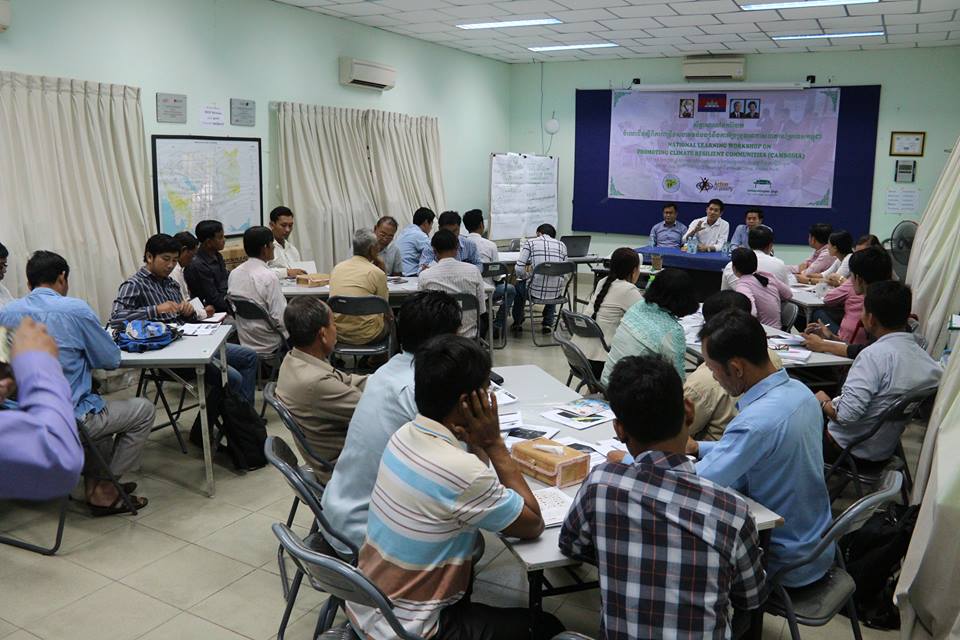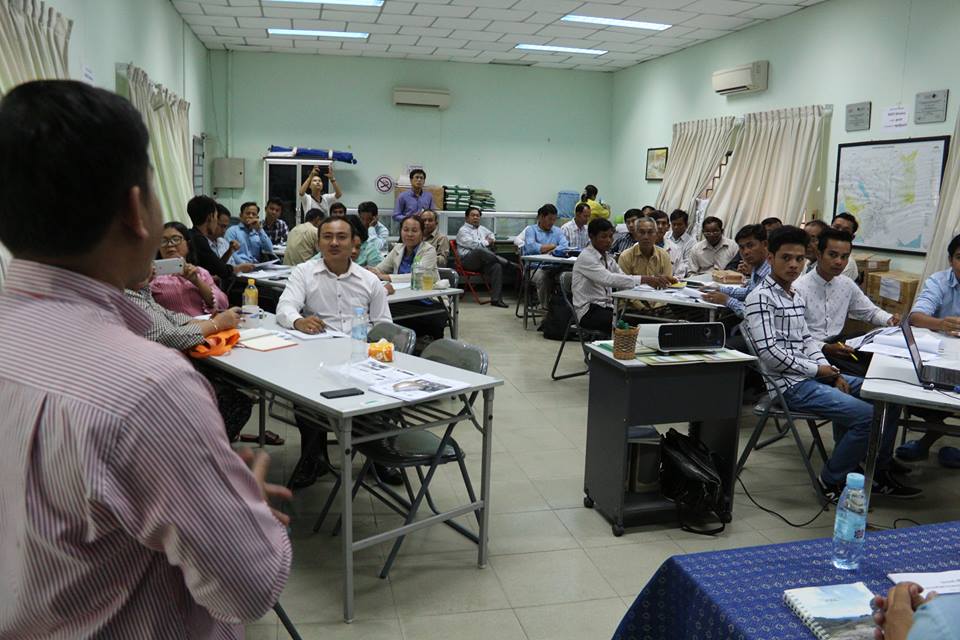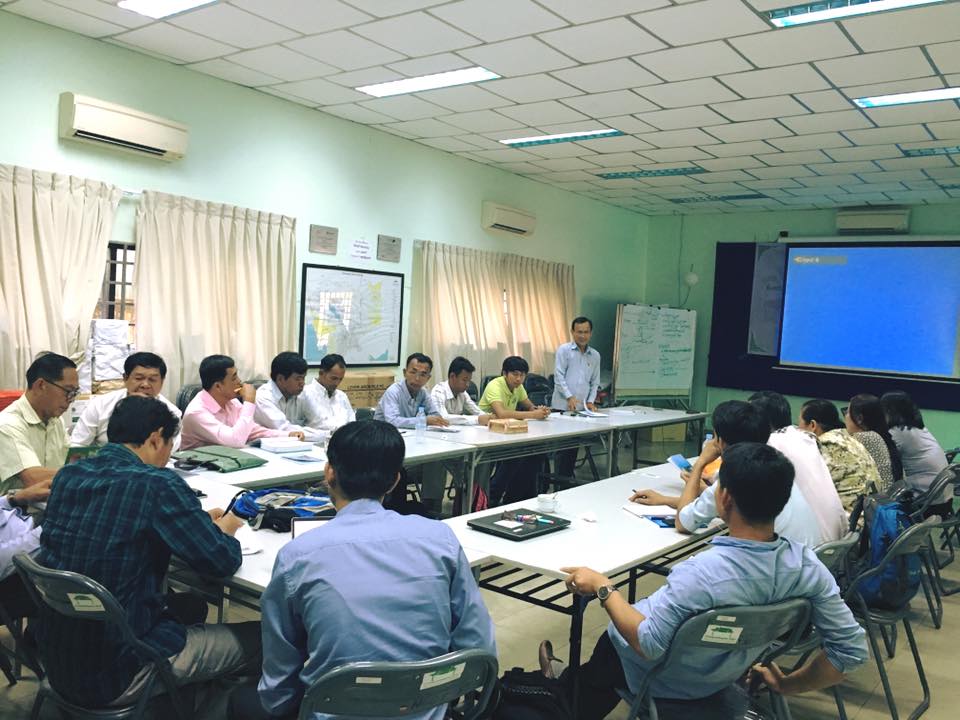
On July 19-20, 2017: There were 19 participants of NGO Environment and Climate Change Alliance (NECA) of the NGO Forum on Cambodia (NGOF) gathered in the third quarter NECA meetings simultaneously follow 1) NECA Steering Committee Meetings on morning of 19 July 2017 at NGOF Office 2) National Sharing Workshop on Promoting Community Resilience to Climate Change on afternoon of 19 July 2017 at NGOF Office and 3) NGOF Quarterly Member Meeting and NECA Member Meeting on 20 July 2017.
The main objectives of the meetings are 1) update the ongoing individual NECA member’ s activities, 2) update the tracking of Climate Change Adaptation (CCA) mainstreaming into CIP/CDP, 3) discuss on Vulnerable Reduction Assessment Report conducting by COCD, 4) discuss on LANGO, Environmental Code, and 5) develop new advocacy road map of NECA.
The NECA members currently consist of 50 local and international organizations which are very active working on Environment and Climate Change issues with both national and sub-national level. They seek for motivate and build capacity in target areas by awareness raising and understanding of climate risks and locally appropriate strategies and plans to respond and adapt. They also provide the technical and financial support to local communities and authorities to build the resilience to climate change impacts. The focus of this component will be on making information about climate change impacts, climate services and pro-poor strategies accessible, relevant and useful to communities, especially for vulnerable groups such as women, youth and children. The Joint Principle for Adaptation is centre of activity implementation where participation, inclusive, local planning, transparency and accountability principles such and such have been used by NECA members.
There are some barriers regarding to project implementing at sub national level. The communal election in June 2017 and Law on Associations and Non-Governmental Organizations (LANGO) are identified as key challenge to NECA members for mainstreaming CCA at sub national level where new commune administration and councils just on board and timeline for developing the CIP/CDP normally around August to October.
So far, we had discussed to relevant Development Partners (DPs) and ministries as well as joint relevant events/ workshops/meetings to collaborate with regional and international partners working on CC issue to convince DPs and RGC to ensure the financial flow on CCA to commune level.

During the sharing workshop; local communities, authorities and CSO partners including NECA members discussed and shared experiences around Climate Resilient Communities in Cambodia. This national learning workshop co-organised by the NGO Forum on Cambodia and its NECA members; Action on Poverty (AOP) and Cambodian Organization for Children and Development (COCD).
There are two presentations conducting during that time which highlighted the contextually-appropriate vulnerability assessment methodology and risk mapping tool and also contributed to enhancing CSO members and partners ‘capacity to assess key climate risks. It achieved this through raising awareness of community reported climate change impacts among key civil society actors, local government and communities. The project used a localized methodology to assess climate vulnerability (VRA) and mapped natural and built infrastructure assets using google maps to assist communities and their development partners to plan future adaptation.
Following to these meetings; NECA members also engaged to The NGO Forum on Cambodia Quarterly Member Meeting conducted on 20 July 2017. There are approximately 120 participants from national and international NGOs members, development partners and representative from Ministry of Interior. The topics were focused on: 1)- updating on significant progress report of NGO Forum in the last quarter May-June 2017, 2)- updating on year to date expenditure of NGOF from January-June 2017,3)-understanding of Law on Association and Non-Governmental Organization and its requirements, and lastly, collecting inputs for final program evaluation (2015-2017).
Regarding to Climate Change Strategic Advocacy and last NECA meeting; we NECA members agreed to organize a regularly meeting among his steering committee and members in order to 1) meet and share information on sensitive/hot news on climate change and advocacy activity plan, 2) raise members concerns and challenges in their work at grass root level especially climate change adaptation mainstreaming into CIP/CDP, and 3) seek for solution(s) to address concerns and challenges raised regarding to climate change issue.
Based on Climate Change Financing Framework, August 2015 reported that based on the scenario of a 2°C temperature rise by 2050 estimates that the full damage of climate change on Cambodia’s GDP will be at least 1.5% in 2030, and 3.5% in 2050.

In other words, if the annual growth rate of GDP without climate change was expected to be 4.5% in 2030, it would be reduced to 3% due to the impacts of climate change. By 2050, GDP growth could be almost entirely offset (reduced to 1% only) by the impacts of climate change.
Most of the damage from CC will come through increased variability of rainfall, including extreme events such as floods and droughts. The main sources of this damage are from: drought and floods in agriculture (1.42% of GDP); increased burden of diarrhoea and other climate sensitive diseases (0.85% of GDP); more rapid degradation of infrastructure, including roads, irrigation and rural water supply (0.71% of GDP); and flood damage to urban infrastructure (0.25% of GDP).